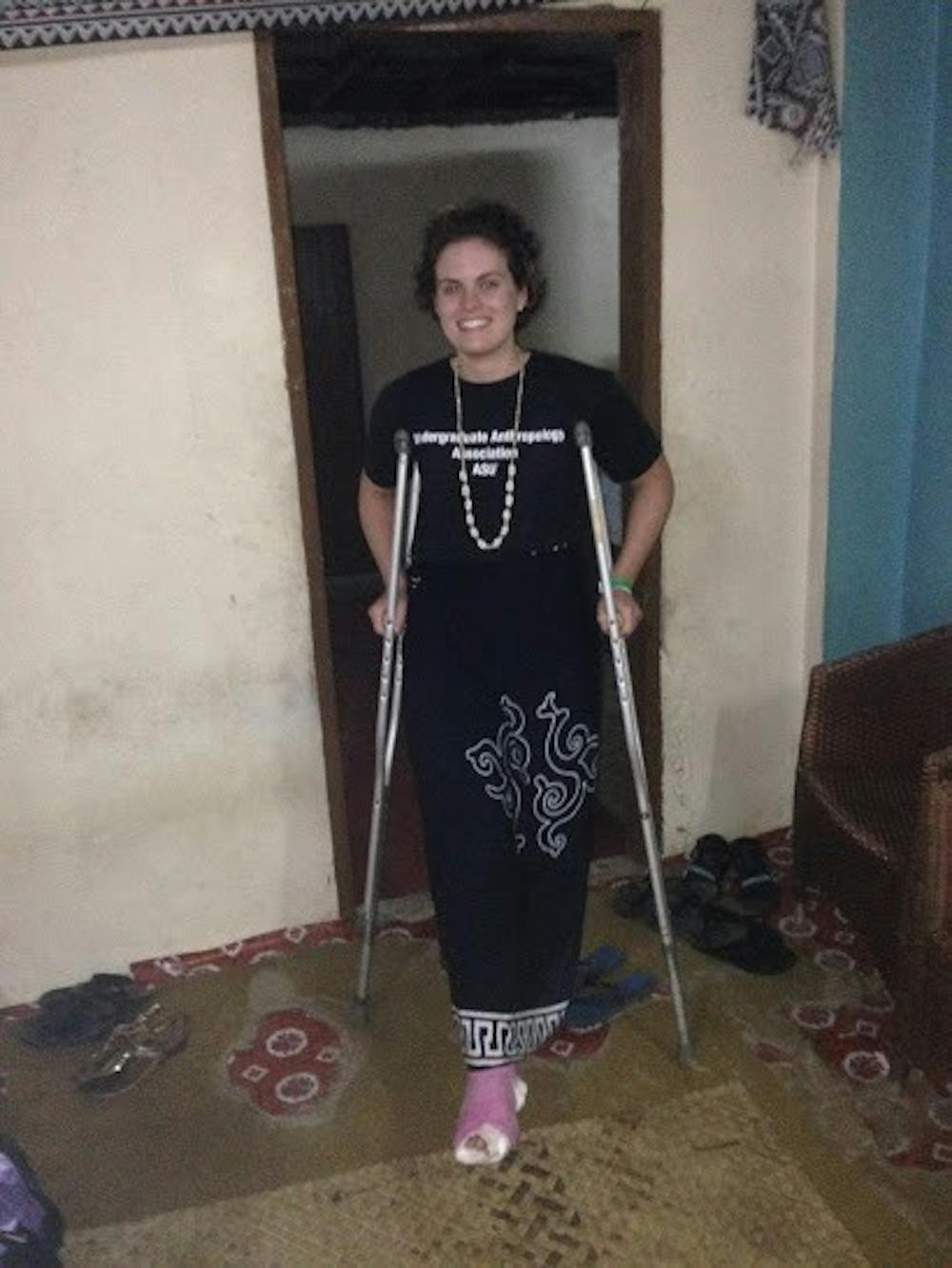For people living in Votua, a coastal village in southern Fiji, basic medical supplies are far from abundant.
That’s something anthropology and sustainability senior Colby Howell found out the hard way after she broke her foot on the first day of her School of Human Evolution and Social Change study abroad program last summer.
Howell said she was dancing with friends when she misstepped and fell, causing her to break her right foot.
“I slipped, and I fell, and I heard it pop,” she said.
When she visited the local hospital two days later, her foot was immobilized in a cast of papier-mâché. However, all eight pairs of crutches the hospital owned had already been rented out to other patients, and the hospital did not have any wheelchairs.
Howell had no choice but to walk on her broken foot, which caused her papier-mâché cast to dissolve in a matter of days.
“Having this broken foot — having to walk on it and endure the pain — I feel like I was able to directly experience what their life is like everyday (in Votua),” she said. “If someone breaks their foot, they can’t get it fixed. It’s a struggle, it’s expensive and it’s time-consuming.”
Howell said her experience as a recipient of medical care in Fiji gave her and her fellow students studying abroad the extra motivation they needed to begin a medical supply fundraiser for their host community.
“We have the power to do more and to help these people, even if it’s in a minor way,” Howell said. “I might not be changing the world, but if I can provide someone with a set of crutches, that could be a game-changer.”
She emphasized that a little bit of money can go a long way when it comes to buying basic medical supplies in Fiji and that basic medical supplies could have a great impact on the lives of people living in the community that hosted her while she was abroad.
“We stayed in the village for a night, and we spent three total days with these people,” she said. “In comparison to our western standards, they have nothing. They don’t have doors on their homes. … They don’t even have hand soap to wash their hands with after they go to the bathroom, but they are the happiest, most beautiful people I’ve ever met. They deserve more.”
Brooklyn Elkan is a registered nurse earning her bachelor’s degree in global health and nursing at ASU, and it was her idea, on the last day of the SHESC study abroad program in Fiji last summer, to collect money from her fellow program participants in order to buy medical supplies for Votua and its surrounding villages.
“It was really empowering, that idea of … helping these people that really have nothing, but are so grateful for everything,” Elkan said. “They shared everything with us, and I just felt like it was awesome to give back to them, because they’re such a happy, great people.”
Elkan, who stayed in Fiji with her husband after the SHESC study abroad program ended, collected more than $300 from her fellow students before they left. She bought out all the medical supplies in eight different local pharmacies to give to a village nurse in Votua.
She stays in communication with that nurse even now that she has returned to Arizona, and she remains committed to bringing more medical supplies to Votua.
“We helped take care of their kids, and we helped plant their gardens,” she said. “We were a part of their community, and a lot of us feel like we still are a part of that community. Just like we would help our family here, we want to help our family there.”
Elkan and the other ASU students who studied in Fiji over the summer put together a PitchFunder page with the goal of raising $3,500 for their host community. More than $3,000 dollars have already been donated to their cause.
The money will be spent buying medical supplies, including crutches, wheelchairs, bedpans, bandages, betadine and burn cream, as well as other necessities like reusable diapers and rugby balls for village children.
“I’m really excited for what (the fundraiser) can become,” Elkan said. “I’m excited for what it will be. As of right now, we’ve raised a great amount of money, which is fantastic, but I’m really excited to see it in action.”
Anthropology professor Jameson Wetmore supervised last summer’s study abroad program in Fiji. He said even the simple first aid kits many students bring with them to Votua are valuable to villagers.
“The medical supplies we brought in those little first aid kits aren’t going to change the world,” Wetmore said. “But… a Band-Aid and little bit of antiseptic cream can actually go a long way toward making your day a lot better than it otherwise would’ve been.”
He said he is impressed by his students’ efforts go above and beyond in helping to improve the conditions of medical treatment in their Fijian host community and hopes students who visit Votua in the coming years will build upon their efforts.
“When I take the students this coming summer, … my suspicion is that once they see it happening and they are a part of delivering medical supplies themselves, they’ll be working the following semester to raise a bit more money,” he said.
Reach the reporter at megannphillips@asu.edu or follow her on Twitter @megannphillips
Like The State Press on Facebook and follow @statepress on Twitter.









